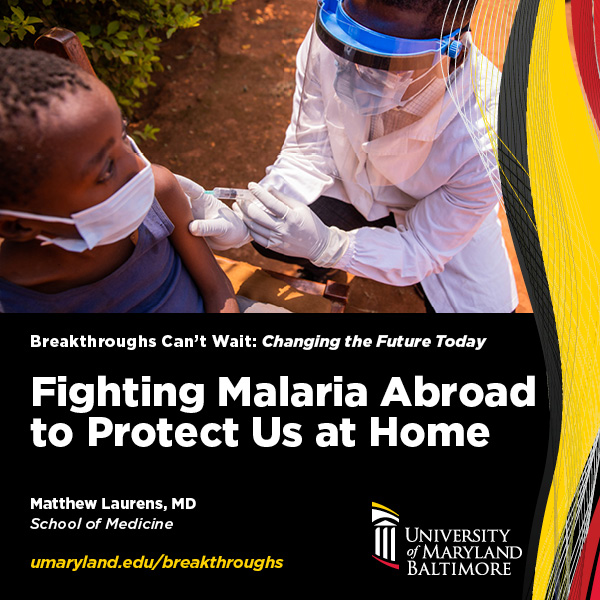Breakthroughs Can’t Wait: What If Fighting Malaria Abroad Protected Us at Home?
July 16, 2025 UMB Office of Communications and Public Affairs
Matthew Laurens, MD, MPH, of the School of Medicine is studying how children’s bodies process IV artesunate — the front-line treatment for severe malaria.
At the University of Maryland, Baltimore (UMB), groundbreaking discoveries happen every day — transforming medicine, improving health, and shaping the future. From changing legal policy to pioneering treatments to cutting-edge scientific breakthroughs, UMB researchers are tackling real-world challenges and making a lasting impact on lives everywhere.
In our “Breakthroughs Can’t Wait: Changing the Future Today” series of videos, we will dive into inspiring stories of innovation from across UMB’s seven schools. See how scientists, doctors, and experts are addressing today’s most pressing issues — fueled by the critical support of government funding that drives progress forward.
Refining a lifesaving drug could be the key to helping more children survive severe malaria.
That pursuit is at the heart of the research of Matthew Laurens, MD, MPH. Laurens, professor of pediatrics at the University of Maryland School of Medicine, is studying how children’s bodies process IV artesunate — the front-line treatment for severe malaria — with support from the National Institute of Allergy and Infectious Diseases.
His commitment to global health began as a newly minted college graduate, when he witnessed the impact of infectious diseases firsthand. “I joined the U.S. Peace Corps before medical school, and it was during the U.S. Peace Corps service that I really became passionate about pursuing medicine as a career,” Laurens explained. “There I learned about diseases that affect marginalized populations and people living in areas with limited resources.”
Partnering with researchers in Uganda, Laurens’ team is examining how dosing might be optimized to save more lives, especially in cases of cerebral malaria, where the disease reaches the brain and becomes far harder to treat.
While malaria is rare in the United States, Laurens noted that locally acquired cases have recently been reported in states like Maryland. He said that if advances are made abroad, “then we can reduce the risk — not only to communities where malaria still exists, but we can also reduce the risk to U.S. citizens who live at home and who might be at risk if malaria were to be reintroduced.”
In a new video Q&A, Laurens shares why this research is so urgent and how saving children abroad helps protect lives everywhere.
You can watch the video below as he shares more about this lifesaving work.